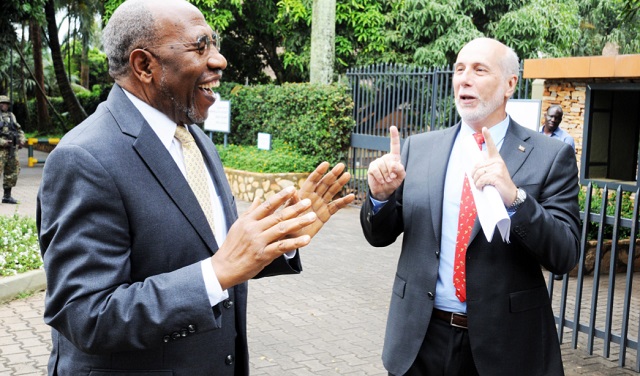
The EAC member state has presented opportunities to European investors
Kampala, Uganda | JULIUS BUSINGE | Trade between Uganda and European Union has over the years been critical in terms of creating jobs and strengthening the economies for the two parties.
This opportunity is expected to be sustained evidenced by the recent inaugural two day Uganda – Europe Business Forum that was held at Speke Resort Munyonyo. More than 1,000 delegates from selected participating countries attended the Forum.
The first ever Forum happened at a time the EU was firming its trading ties with other countries following Britain’s exit from the 27member bloc at the end of January 2020.
Minister presents big opportunities
Speaking during the Forum, the Minister of Trade Industry and Cooperatives, Amelia Kyambadde said that Uganda and EU were good trading partners and that the relationship should be kept strong.
She listed Uganda’s trading partners within the EU as Netherlands, Italy, Belgium, Germany, UK and Denmark on the import side.
Uganda exports to Europe food and live plants/animals, crude materials, inedible and more. She said that Uganda exports on average $60.7million out of the $100bn of EU’s annual average imports.
Uganda’s major imports from the EU are machinery, transport equipment, chemical and related products, miscellaneous manufactured articles and manufactured products.
Kyambadde said, Uganda’s exports are not as diversified as her imports from the EU because it exports mainly primary unprocessed products and imports manufactured industrial products.
In terms of foreign direct investment, inflows into Uganda increased from the $543.9million in 2010 to $1.337bn in 2018. In the same period, Uganda accounted for an average of 13% of total FDI inflows to the 11 Eastern Africa countries – an indicator of Uganda being more attractive than the other countries.
Globally, the EU is a major source of FDI accounting for 30% of global inflows according to figures compiled from 2010 to 2018.
EU companies mainly from Dutch, French, German, Italian, Danish, Belgian and Swedish are already actively investing in Uganda in the various sectors of the economy. The sectors in question include; energy, services (tourism, construction, professional transport and logistics, manufacturing, food processing, metal and basic manufacturing.
“More investment opportunities abound; more companies needed,” Kyambadde said. She added that opportunities to invest in other sectors like oil and gas are immense.
Kyambadde said Uganda has a very supporting business environment. First, she said that the country has reviewed and updated the 2008 industrial policy which is now targeting increasing manufacturing value added to GDP from 8.2% in 2018 to 16% by 2030.
The policy also envisages strong public – private and private-private sector partnerships. She also said the country’s electricity generation has improved currently at 1, 182MW as at June 2019 – which provides opportunities for value addition and food preservation. She also said that investments in green economy is a government priority and an opportunity for the private sector.
The good business environment also has to do with improved road infrastructure – border to border movement on tarmac with 4, 971km tarmac. More expressways are lined up for construction. The rehabilitation of the meter gauge railway is ongoing and initiatives for construction of the Standard Gauge Railway (SGR) is in advanced stages.
A total of 22 industrial parks are to be set up, of which at least six are already functional (Namanve, Luzira, Bweyogerere, Soroti, Mbarara and Jinja). There are also private sector developed industrial parks in Kapeka, Mbale and Kiruhura.
In terms of regional trade facilitation, Kyambadde said the country has got functioning infrastructure like electronic cargo tracking system, regional customs guarantee scheme, trade portal, and electronic single window. The others are construction of one stop border posts and plans are on to construct Border Export Zones linking Uganda to key and strategic regional markets.
In terms of communication, private sector companies and government investments have enhanced ICT infrastructure with 4G internet availability, high penetration of mobile telephone and mobile money services. There is also an opportunity to co-invest with government in big and strategic investments through the Uganda Development Corporation (UDC).
There is also strong political will to fight corruption in all forms – this is backed by the presence of the legal and institutional measures such as the leadership code act, anti-corruption court, inspectorate of government, presidential hotline for receiving corruption reports.
Above all, she said that the thrust of the economy is being sustained under National Development Plan III focusing on industrialization (agro-industrialisation, mineral beneficiation, oil and gas and tourism).
In addition, the launch of the Sustainable Business for Uganda Platform and the Uganda-EU Business Forum provide avenues for working together to make trading and investing with each other even better, according to Kyambadde.
 The Independent Uganda: You get the Truth we Pay the Price
The Independent Uganda: You get the Truth we Pay the Price


